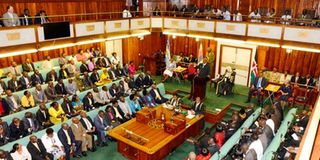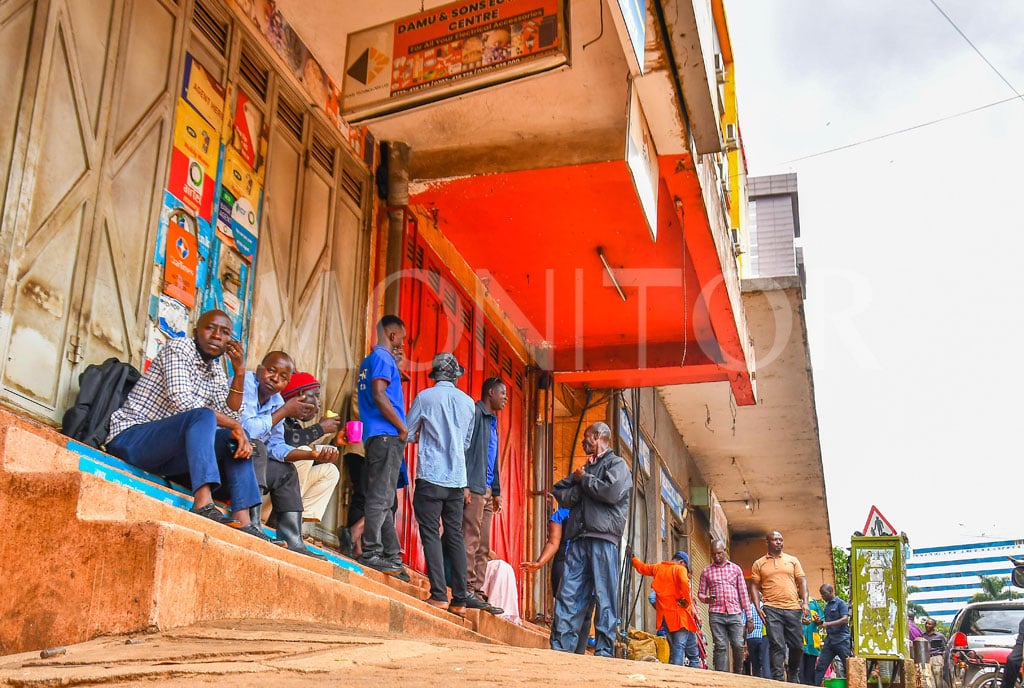Counting the cost: what mps’ tax exemption means

Parliamentarians say only their salary, totalling about Shs2.5 million should be taxed. FILE PHOTO
What you need to know:
In February this year, the Commercial Court ordered the Parliamentary Commission to deduct tax from MPs’ emoluments. Speaker Rebecca Kadaga said the Parliamentary Commission would appeal the judgement. A few weeks ago, Parliamentarians amended the Income Tax (Amendments) Bill, 2016 to exempt their emoluments from taxes.
The Parliament of Uganda, a fortnight ago, amended the Income Tax (Amendments) Bill, 2016 to exempt the legislators from having their emoluments taxed.
The amendment tabled by Rubanda East MP, Mr Henry Musasizi, amid opposition from minister of State for Primary Health Care, Sarah Opendi agreed that only the legislators’ basic salary, totalling about Shs2.5 million be taxed.
But while the legislators hope that the President signs the Bill, members of the public, civil society organisations and the ministry of Finance have come out strongly to criticise the ‘selfish nature of those sent to represent them,’ because of the socio-economic impacts.
On Monday, Keith Muhakanizi the Secretary to the Treasury said the first principle of equity is taxation.
“All of us must pay taxes. Our position as the Ministry of Finance/Treasury is very strong - the principle of equity must apply,” he told journalists during the quarterly Budget transparency news conference.
Cissy Kagaba, the executive director Anti-Corruption Coalition for Uganda, said exempting MPs from paying taxes does not make sense because their allowances are higher than their salaries.
“Not mentioning other allowances, MPs all together take home about Shs57 billion which we tax payers pay them and a monthly salary of about Shs2.6million. Their allowances are higher than their salaries and it’s only fair and logical that they are taxed,” she said on Monday.
It is estimated that if President Museveni assents to this Bill, Uganda will lose about Shs49.2billion additional revenue annually, close to Shs9 million per MP per month.
“If this money was generated, it can help government address some of the most pressing national issues such as revamping the health sector, job creation, financing the education sector and other requirements, a statement by the National Youth Leadership Dialogue. NYLD comprises leaders of youth civil society organisations, newly elected district youth councillors, student leaders and members of the Interparty Youth Platform.
Economic Implications
Minister Opendi has questioned the move and sided with the disgruntled public. She says government will definitely lose a lot of revenue if that component is not sorted and the MPs’ allowances are not taxed.
“There are many unfunded priorities to be sorted. By not taxing MPs’ allowances, it only means that these gaps will not be filled easily. Government will lose money which can fill some of these gaps,” she remarks.
Just like Ms Opendi, Mr David Walakira, a budget policy specialist, Civil Society Budget Advocacy Group (CSBAG) says there are several gaps in the existing Budget that need money.
“These include; The Social Assistance Grants for Empowerment (SAGE) which needs Shs8.69 billion to roll out and help the elderly and other marginalised groups of people and the scheme of services which ultimately requires Shs14.4 billion,” he explains.
JOB CREATION FOR UNEMPLOYED YOUTH
Youth who are the majority citizens in Uganda and biggest tax payers have raised concerns and say over how the Shs49.2 billion would redeem the looming unemployment in the country. The exempted money would fund youth programmes like the Youth Livelihood programme.
“With an investment of Shs35 billion, the Youth Livelihood programme was able to create 200,000 jobs in its first year of office. With Shs49.2billion injected in the programme, the number of Jobs will therefore shoot up to 240000 Jobs,” says Timothy Kibaale, youth officer, ActionAid Uganda.
Moral implications
Meanwhile, exempting MPs from paying taxes on their allowances does not only pose economic challenges to the country but also has moral implications.
According to Walakira, more groups in the country will start asking government to exempt them from paying taxes.
“For instance, health workers’ lunch allowances are taxed. Therefore, everyone believes they pay MPs and they can only give back by contributing to taxes,” he says.
Walakira is not the only one thinking in that direction.
Kagaba, who described the move as discriminative in nature says, “Incase various voices are not heard and the President signs the amendment, there is no way other groups will be stopped from asking for the same. They are already disenfranchised”.
As a result of non- compliance by other tax payers, Paul Wayero says it will further lead to more losses of revenue which would be used to stablise the economic sector.
“Uganda is currently working on reducing donor dependency to ensuring that we fund most of our Budget. This may not be achieved if instead of enhancing local revenue collection, we are opting for exemption,” notes Ms Teopista Kizza, coordinator, Youth Coalition for Electoral Democracy.
Secondly, Ms Kizza says it will also become a tradition that whenever MPs start their term of office, they change laws in their favour without thinking or putting into consideration the rest of Ugandans who are poor and cannot even afford basic needs.
“Instead of formulating or revising laws that favour such people, they will be thinking about their selfish interest which is contrary to the reason they are voted into office,” she says, adding that exemption enhances inequality and injustice which may result into insecurity and social unrest.
Kagaba notes: “Ironically, all their entitlements are from us. The Commercial Court had just ruled that they had to pay taxes and before we knew it, they had amended the law themselves which is abuse of court. They appealed and therefore should have waited for judgment.”
It will also be hard for MPs to preach patriotism again. There is no way they will expect citizens to be patriotic when they themselves are not. How can you be patriotic when you don’t want to pay taxes?
To this end, with all the public’s raving about the situation, MPs are not just about to back off and let go.
The Serere District MP Alice Alaso says she does not think any MP is jubilant for not paying taxes.
However, she says, “A way has to be found on how MPs will get fuel. The position of availing MPs with fuel should be harmonised. Residential District Commissioners and all public servants get their fuel in kind and therefore it’s not taxed. MPs are taxed because they get theirs in cash”.
She adds; I am very sure every MP is willing to pay tax only when there is harmony of resources. It has to be made clear whether it’s income or allowances because fuel to and from their respective constituencies is measured in mileage.
Health sector
To this end, the health sector is one of those in dire need for money. “The money that the MPs want to deny the economy could beef up the health sector especially with the looming cancer scourge. This money is required now more than ever,” says Mr Paul Wayero, Monitoring, Evaluation, Accountability and Learning (MEAL) consultant.
Other gaps include the National Health Scheme which has a shortfall of Shs5 billion and Shs3.35 billion is required for funding newly rehabilitated hospitals; this includes procuring equipment and staffing. Also, Shs36 billion is needed as funding capital for 3,542 health workers.
“The money could easily fill some of these gaps,” says Walakira.




